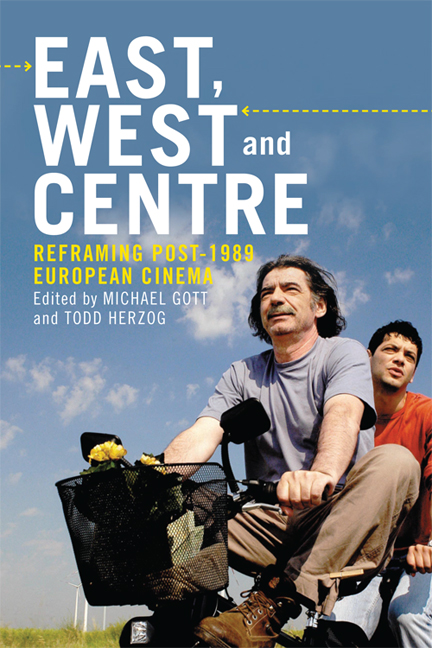Book contents
- Frontmatter
- Contents
- List of Figures
- Notes on Contributors
- Acknowledgements
- Introduction: East, West and Centre: ‘Mapping Post-1989 European Cinema’
- Part I Redrawing the Lines: De/Recentring Europe
- Part II Border Spaces, Eastern Margins and Eastern Markets: Belonging and the Road to/from Europe
- Part III Spectres of the East
- 14 Through the Lens of Black Humour: A Polish Adam in the Post-Wall World
- 15 East Germany Revisited, Reimagined, Repositioned: Representing the GDR in Dominik Graf's Der rote Kakadu (2005) and Christian Petzold's Barbara (2012)
- 16 Barluschke: Towards an East–West Schizo-history
- 17 The Limits of Nostalgia and (Trans)National Cinema in Cum mi-am petrecut sfârşitul lumii (2006)
- 18 The Ideal of Ararat: Friendship, Politics and National Origins in Robert Guédiguian's Le Voyage en Arménie
- Notes
- Bibliography
- Index
15 - East Germany Revisited, Reimagined, Repositioned: Representing the GDR in Dominik Graf's Der rote Kakadu (2005) and Christian Petzold's Barbara (2012)
from Part III - Spectres of the East
Published online by Cambridge University Press: 05 September 2016
- Frontmatter
- Contents
- List of Figures
- Notes on Contributors
- Acknowledgements
- Introduction: East, West and Centre: ‘Mapping Post-1989 European Cinema’
- Part I Redrawing the Lines: De/Recentring Europe
- Part II Border Spaces, Eastern Margins and Eastern Markets: Belonging and the Road to/from Europe
- Part III Spectres of the East
- 14 Through the Lens of Black Humour: A Polish Adam in the Post-Wall World
- 15 East Germany Revisited, Reimagined, Repositioned: Representing the GDR in Dominik Graf's Der rote Kakadu (2005) and Christian Petzold's Barbara (2012)
- 16 Barluschke: Towards an East–West Schizo-history
- 17 The Limits of Nostalgia and (Trans)National Cinema in Cum mi-am petrecut sfârşitul lumii (2006)
- 18 The Ideal of Ararat: Friendship, Politics and National Origins in Robert Guédiguian's Le Voyage en Arménie
- Notes
- Bibliography
- Index
Summary
Book and box-office sales vary but publishers, broadcasters and producers recognise that, more than twenty years after the collapse of the East German state, the interest in the German Democratic Republic, from the thanatouristic curiosity in the GDR's dark sites and misdeeds to the desire to know more about the everyday life histories, is sufficient to warrant continued investment. Conflicted memories, new revelations and diverging opinions have been a mainstay of post-GDR discourse, in some cases almost eclipsing the texts themselves, as was evident in the reception to Das Leben der Anderen The Lives of Others (Florian Henckel von Donnersmarck, 2007, Germany) and the reporting of Angela Merkel's selection of Die Legende von Paul und Paula The Legend of Paul and Paula (Heiner Carow, 1973, GDR) as her favourite film (doubtless with an eye on the East German constituency and the 2013 election).
East German autobiographies, memoirs, and documentary series arguably enjoy good ratings because these programmes, featuring ordinary East Germans talking about their lives in the GDR, offer more nuanced accounts than had previously been the case and, in so doing, shift post- GDR discourse from the victims and villains narrative to one that privileges private experience over broad historical surveys, an emphasis, then, on personal, rather than professional, accounts which broadly corresponds with what Maier (5) terms the ‘dialectic of Herrschaft [domination] and Gesellschaft [society]’. Surveys and questionnaires bear out the East Germans’ somewhat proprietorial approach to accounts of lives lived, a suspicion that is well founded given that West Germans have tended to mediate East German history (Ahbe 2011). But, while many people rationalise this approach, arguing that it goes some way to providing a normalised portrait of the GDR, critics (including numerous politicians) have attributed the inaccurate history and conspicuous errors that characterize many young people's knowledge of the GDR to the increased focus on the politics of the everyday, arguing that this is what happens when ostensibly objective historical accounts are eclipsed by a range of subjective histories narrated according to limited personal experience and selective or inaccurate memory. The Sabrow Commission, established in 2005 to assess the different modes of remembering the GDR and to make recommendations regarding memorialisation proposals, observed the disjuncture between Eastern and Western accounts of the GDR and noted, too, problems in the secondary education treatment of the GDR as well as a general trivialisation of the state.
- Type
- Chapter
- Information
- East, West and CentreReframing post-1989 European Cinema, pp. 237 - 252Publisher: Edinburgh University PressPrint publication year: 2014



